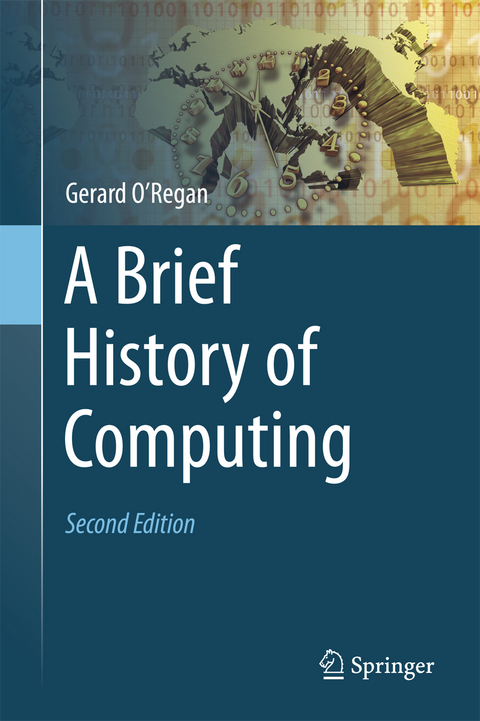
A Brief History of Computing
Seiten
2014
|
2nd ed. 2012
Springer London Ltd (Verlag)
978-1-4471-5960-5 (ISBN)
Springer London Ltd (Verlag)
978-1-4471-5960-5 (ISBN)
- Titel erscheint in neuer Auflage
- Artikel merken
This lively and fascinating text traces the key developments in computation – from 3000 B.C. Topics and features: ideal for self-study, offering many pedagogical features such as chapter-opening key topics, chapter introductions and summaries, exercises, and a glossary;
This lively and fascinating text traces the key developments in computation – from 3000 B.C. to the present day – in an easy-to-follow and concise manner. Topics and features: ideal for self-study, offering many pedagogical features such as chapter-opening key topics, chapter introductions and summaries, exercises, and a glossary; presents detailed information on major figures in computing, such as Boole, Babbage, Shannon, Turing, Zuse and Von Neumann; reviews the history of software engineering and of programming languages, including syntax and semantics; discusses the progress of artificial intelligence, with extension to such key disciplines as philosophy, psychology, linguistics, neural networks and cybernetics; examines the impact on society of the introduction of the personal computer, the World Wide Web, and the development of mobile phone technology; follows the evolution of a number of major technology companies, including IBM, Microsoft and Apple.
This lively and fascinating text traces the key developments in computation – from 3000 B.C. to the present day – in an easy-to-follow and concise manner. Topics and features: ideal for self-study, offering many pedagogical features such as chapter-opening key topics, chapter introductions and summaries, exercises, and a glossary; presents detailed information on major figures in computing, such as Boole, Babbage, Shannon, Turing, Zuse and Von Neumann; reviews the history of software engineering and of programming languages, including syntax and semantics; discusses the progress of artificial intelligence, with extension to such key disciplines as philosophy, psychology, linguistics, neural networks and cybernetics; examines the impact on society of the introduction of the personal computer, the World Wide Web, and the development of mobile phone technology; follows the evolution of a number of major technology companies, including IBM, Microsoft and Apple.
Dr. Gerard O’Regan is a CMMI software process improvement consultant at SQC Consulting, and a visiting lecturer at Limkokwing University of Creative Technology, Malaysia. He is the author of the Springer titles Introduction to Software Process Improvement, Mathematical Approaches to Software Quality and A Practical Approach to Software Quality.
Computing in Early Civilisations
What is a Computer?
Early Computers
Developments in the 1950s to 1970s
Revolutions in the 1980s and 1990s
IBM
Technology Companies
The Internet Revolution
History of Programming Languages
History of Software Engineering
People in Computing
Foundations (Boole and Babbage)
Claude Shannon
Alan Turing
Artificial Intelligence
| Zusatzinfo | XXIV, 264 p. |
|---|---|
| Verlagsort | England |
| Sprache | englisch |
| Maße | 155 x 235 mm |
| Gewicht | 444 g |
| Themenwelt | Sachbuch/Ratgeber ► Natur / Technik |
| Mathematik / Informatik ► Informatik | |
| Naturwissenschaften | |
| Schlagworte | Informatik, Geschichte |
| ISBN-10 | 1-4471-5960-8 / 1447159608 |
| ISBN-13 | 978-1-4471-5960-5 / 9781447159605 |
| Zustand | Neuware |
| Haben Sie eine Frage zum Produkt? |
Mehr entdecken
aus dem Bereich
aus dem Bereich
eine neue Sicht auf unsere Emotionen
Buch | Hardcover (2023)
Rowohlt Taschenbuch (Verlag)
CHF 39,20
was die Physik über die Welt und das Leben verrät
Buch | Hardcover (2023)
Siedler (Verlag)
CHF 36,40


